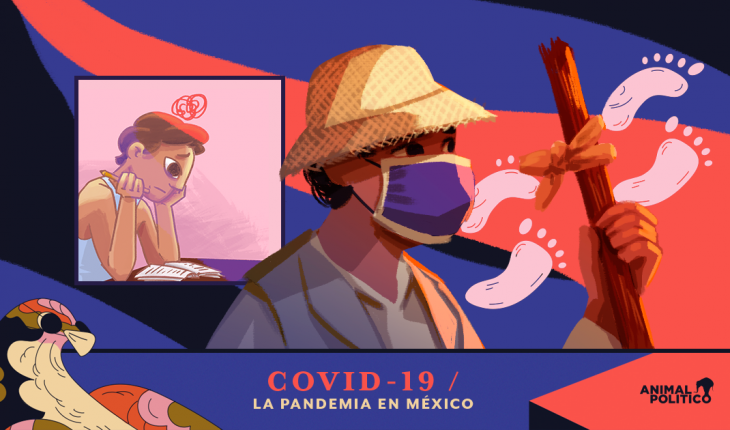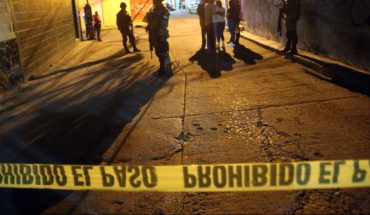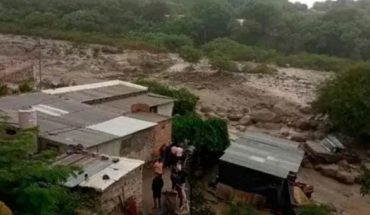Roberto Cruz
Mazahua Indigenous Master, 65
This year of pandemic has been a great challenge and also a great despair. Because, the mere truth, no one was prepared for this terrible thing that we are living. And neither do teachers, of course. We were neither prepared nor academically to teach remotely, nor do we have the necessary educational infrastructure.
Look, I’m from a Mazahua-speaking community called San Antonio Metepec, in the Mexiquense municipality of San Felipe del Progreso. The community is there for a hill called ‘El Cerro de la Luna’, and it is an area where there is usually no good telephone coverage, no Internet. In fact, very few people have a television. That’s why the TV class thing hasn’t worked. Because a lot of families don’t have the money to buy one. And the few that do have the device, because children prefer to see cartoons than be watching the classes. That’s the way it is. Max, if the parents have to go out looking for a job and the kids are left home alone.
Your server’s job is to tour rural communities where, flatly, many parents don’t have access to a cell phone, computer, or television, and I’m leaving sheets printed on them with the teaching material. Then I ask the children what doubts they wrote down in their notebooks and I also ask the parents. Although, well, parents can’t help their children much either: most people don’t know how to solve math operations, nor can they help them with the development of reading comprehension, because they can’t read or write. They’re illiterate. And that has also been a big problem in this new distance education.
Read: Battles to Learn at Home: This Is What Classes Look Like in the Middle of the Pandemic
Moreover, many parents were also not interested in distance education. Some because it was flat. And others because they’re too busy trying to see how they do it to get ahead in pandemic.
That’s why many families come and say, ‘Look profe, or I put a balance on the phone for the child’s classes, or I feed my family. We can’t do any more.’ And in those cases, what do you tell them? I try to convince them that they have to make an even greater effort to keep their children studying, so they don’t drop out of school. But I can’t blame those people at all either, because many don’t have to eat.
And yes, we all know that it is the obligation of the state and the municipality to support the education of the community, of the people. But, the reality is that everyone has to seek life, millet. And teachers too.
I give you an example: no one supports us to do the tours of the communities. It is we, with money from our stock exchange, who take on those expenses. And it still happens with Internet and phone service to give the classes: we have to pay for the teachers, as we also pay the sheets and copies for the children to do their homework and study.
Unfortunately, despite all that effort, there are many children who dropped out of school. They are children who, for the most part, were left alone because their parents, farmers and street traders, kept going out to look for work and try to survive. And this has led to much more exposure to the virus, because because of the lack of sales they have to be moving to other locations and the risk of contagion is higher. And of course, a lot of those people have already died.
There’s the case of Jocelyn, an eight-year-old Mazahua girl who’s in second grade. She lost much of her family. In fact, all she had left was her mom, who’s barely getting out of the virus. As you can imagine, they are children who are very psychologically hurt and who also remain in even greater uncertainty because the livelihood of their homes is gone.
Find out: Teachers and teachers who care: invisible work within classrooms
In cases like this, you as a teacher can’t demand anything from him either. On the contrary, you have to help them, give them your solidarity, be more understanding, and try to make them gradually do the tasks so that they do not fall far behind and do not end up leaving school.
Now, the pandemic has not only affected students. Teachers have also hit us very hard. I myself, your servant, have lost twenty members of my family to that damn virus. twenty! In a single day I got to lose four of a pull. It was a terrible thing.
At least we already have the vaccine, blessed God! And seniors in the community are already being applied. Although that’s not enough to go back to face-to-face classes, as our authorities want. Because most of theparents are not vaccinated yet, neither are children, and teachers much less.
The mere truth, there is much concern among teachers about this issue. Because of course we want to get back to normal, but first there’s the health of one, his family, and also that of the children. And it’s not about coming back anyway, no matter how much when they see you on the street, the first thing parents call you desperate is, ‘When do classes come back? I can’t stand these shamans at home anymore!’
Don’t believe it, I’m afraid of the virus too, of how not. I’m 65 years old and you never know how the body is going to react at that age.
Imagine, I started teaching back in 1972; I am one of the first generation of indigenous teachers in the State of Mexico. Back then there was no pandemic, but it was also very hard times. I had to go from community to community to teach, and there were no concrete roads there. So I was throwing miles walking in the sun and the cold to get to the little towns, where there was no electric light. And my childhood wasn’t much easier: I was barefoot on the school with a little lapicito of a little room, which I could hardly even grab. My brothers and I lived with my mother in a little room, and we covered ourselves in the cold with them because the blanket wasn’t enough for everyone.
I’ve fought a lot, really. Although I still feel strong to continue to support young people. Because that’s precisely why I’m a teacher: to help others. And that’s why I think that this virus, however and that it has brought a lot of pain, is teaching us a great lesson: that we must be more supportive and human with those who have difficulty getting ahead.
W.A. That we learn this lesson well will depend on the future of our youth.
What we do at Animal Politics requires professional journalists, teamwork, dialogue with readers and something very important: independence. You can help us keep going. Be part of the team.
Subscribe to Political Animal, receive benefits and support free journalism #YoSoyAnimal.





